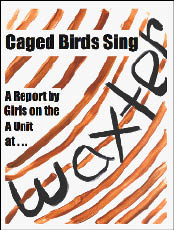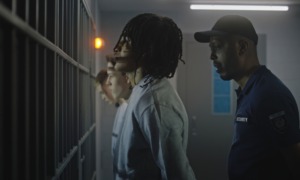 |
These excerpts are from Caged Birds Sing, which was written by teenagers who are committed to Thomas J.S. Waxter Children’s Center in Laurel, Md. Run by the Maryland Department of Juvenile Services (DJS), it is the state’s only secure facility for girls. Separate units hold girls who are committed, girls who are detained awaiting trial and girls who are awaiting other placements.
The booklet, which includes three pages of recommendations on how to treat the girls better and improve the overall juvenile justice system for girls, was the result of a project sponsored by the Maryland chapter of the American Civil Liberties Union. The authors cannot be named.
Who We Are
We are teenagers – mostly between the ages of 15 and 18. We are young ladies. Citizens. We come from all over the state. We have different needs than the boys in DJS. We also need personal things.
We describe ourselves as unique, random, funny, emotional. We enjoy everything from basketball and chilling with friends to computers and music. One of us plays the drums. Another, the flute.
We have dreams, goals and aspirations. We want to be child advocates, pediatricians, businesswomen, computer techs. And maybe even a basketball player for the WNBA.
 |
We often feel that we don’t have the chance to tell our side of the story – it seems that no one wants to hear what we have to say about what we did or did not do wrong and why, and what we need. The reports they give to the judges make us sound horrible. We are more than just the mistakes we have made. People look at us like we’re really bad children and our parents didn’t do anything to teach us right from wrong. Some people are scared of locked-up juveniles.
We want you to know who we are because we feel that the adults and systems making decisions about us – courts, judges, DJS, probation officers – are not getting to know us first. And that leads to bad outcomes for everyone. When you make assumptions about us, we don’t get services that suit us, or placements that make sense. If you get to know us, you will realize that you are locking up people – children, teenagers, girls – who can be safely placed in their communities.
 |
How We Got Here
The road to Waxter
We feel that there is not equal punishment for boys and girls in Maryland. It seems like, for the exact same charge, boys go home, but girls are locked up. Girls are held to a different standard – we’re supposed to be the role models. It doesn’t make any sense. Girls should not be locked in a secure facility for being AWOL or for running away. There should be different types of placements for girls who run away – just like there are for boys.
We have made mistakes, and we can accept responsibility for our mistakes. But that doesn’t change the fact that some of us really don’t belong here, in a secure facility. Waxter is supposed to be a place for girls with three major felonies, but Waxter has girls who don’t meet that criteria.
When we look back at the mistakes we made, we see that we ourselves didn’t understand what we were going through. We kept doing things that got us in trouble. Some of our mothers cried the first time we were locked up. For others, our moms didn’t show up in court. For some, our families aren’t there for us, or can’t be there for us.
Some of us were placed in Waxter to try to keep us safe. Our judges got tired of us running, so they locked us up. But this is not the right place to deal with that, and that’s not a legitimate reason for putting us behind bars. Some of us do need space and time to clear our heads out, but it can be done differently. In a way that doesn’t make us feel like prisoners. Sometimes, we ran away because of abusive relationships at home. We had our reasons for running, but instead of dealing with those reasons, they decided to lock us up. If someone really made an effort to listen to our side of the story, we think they would be able to make decisions about our placements that made more sense. We think that adults would try to come up with more effective solutions if they stepped back and got a better understanding of why we left our placements and did something about that, instead of just deciding the answer is to lock us up.
What It’s Like Here
The building – our cage.
The Waxter building feels like a cage – not a place to help girls learn how to do better. The keys and locking systems are too much work for the staff. We think it’s dangerous. If there was an emergency, like a fire, we would be injured because the staff can’t work the keys fast enough to let us out in time.
Waxter is an old, ugly building that feels like it’s falling apart. Picture cement blocks, layers of dirt and disease, all covered up with ugly-colored paint. Fencing. It’s always too hot or too cold; the temperature is never right and never even – some rooms will be really warm and others so cold that we don’t – and the staff doesn’t – want to use them. Windows with thick screens, caked with dirt, that don’t let the sunlight in. There’s a lot of metal. How are we supposed to focus on improving ourselves in a space that’s all metal and concrete blocks? The building is way too small and the layout doesn’t make sense. The girls from the detention unit have to walk through our unit [area of the facility] to get to school, to medical, to their case managers, and to the cafeteria. That means that they are walking through our unit, disrupting what we’re doing at least a dozen times a day! It’s really distracting – it interrupts whatever we are doing. Imagine trying to have a serious conversation in a group and other girls and staff are suddenly walking through. Even worse, some of the girls have conflicts with each other, so it can create a risk of fighting.
Our rooms are small. They make us feel claustrophobic. They are hard. The mattresses are thin and hard. The beds are too small. There isn’t natural light. The air doesn’t circulate and we miss fresh air. There aren’t bathrooms in our rooms, so we have to ask permission to go to the bathroom. The staff bathroom on our unit gets stopped up and the smell of sewage spreads onto the entire unit. It’s disgusting.
Staff
There are not enough staff for Waxter, especially on the committed unit. That has a real impact on how things work, or don’t work. When there’s only one staff member on our unit, we can’t do the things we are supposed to be doing – we can’t do what’s posted on the schedule, and the activities that are supposed to be part of the Waxter program. Everything is slowed down when there’s not enough staff.
Also, some of the staff in this facility do not seem to understand the rules they are supposed to be following and enforcing, which creates problems and inconsistencies for everyone. Sometimes staff call us names or favor others, and some staff have problems with girls who are gay. We also have problems with things for our unit disappearing – like movies and games – almost as soon as they are brought to the unit.
Some staff are really caring and help us talk though our problems and make us laugh. But they could do even more for us if there were other staff here to help them.
School
We probably aren’t going to be at the same level as other kids in our classes when we go back to school because of the problems with the school at Waxter.
We’re coming in at all different levels but they put us in the same classroom. So if they are teaching to the more advanced student, the other girls can’t follow, and then the teachers are frustrated. It doesn’t make sense to take girls who are on different education levels and teach them as if they’re all the same level.
We are not learning new things at school. We don’t get science. It’s not hands-on or interesting. We feel like we’re getting a fourth-grade education. The teachers don’t always know what they’re doing. Also, they sometimes take their anger with the facility out on us – like when they have to pack up their things to come to teach on the unit, instead of us going to them.
Caged Birds Sing is available at http://www.aclu-md.org/aPress/Press2010/Caged_Birds_Sing.pdf.






























